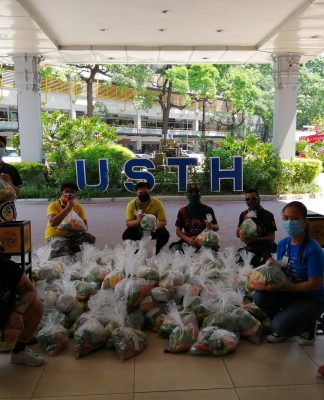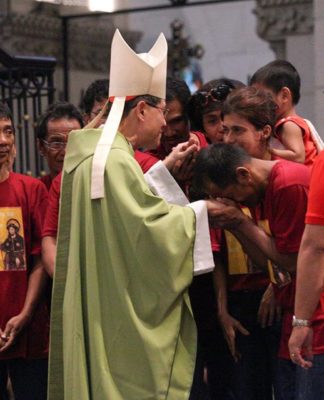INITIALLY dreaming of a free trip to Japan, Thomasian professor Michael Bahrami-Hessari joined this year’s International Biotechnology Leadership Camp (Biocamp) and after a stringent selection process by Novartis, the sponsor of the international event, Bahrami-Hessari emerged as one of the two official representatives of the Philippines to the prestigious convention held in Tokyo last October.
As a student, Bahrami-Hessari readily showed a knack for the sciences perhaps brought about by his family background. “My mom is a biochemist and a professor here in the University while my father is a physician. I also have aunts and uncles who are pharmacists, chemists, and engineers,” he said.
To live up to his folks’ reputation, Bahrami-Hessari entered the College of Science and took up Microbiology, where he graduated cum laude. He is currently pursuing a Master’s degree in the same course at the UST Graduate School while working as a professor at the Department of Biological Sciences of the College of Science.
But he was no geek. To prove his versatility, Bahrami-Hessari once considered a career in writing. In fact, AB Journalism was his second course of choice. He graduated as grade school and high school valedictorian from San Beda College and was editor in chief of The Bedan, the official student publication of San Beda College.
In 2001, he was one of the participants in the Conference on Leadership of the Association of Philippine College of Arts and Sciences, a convention of youth leaders at the Ateneo de Manila University. The year after, he became a semi-finalist in the 5th Hitachi Young Leaders’ Initiative held in Singapore.
Road to Biocamp
According to Bahrami-Hessari, he applied for Biocamp because he wanted to go to Japan. “That was what really attracted me; later on I realized that it would greatly help my current research on antimicrobials,” he said.
Based on Bahrami-Hessari’s submitted credentials and recommendation letters, he was included in the short list of eight finalists who were selected out of over 60 aspiring postgraduate students from top universities. The lucky eight were subjected to a series of interviews and case presentations, such as marketing and medicine formulation, until they were trimmed down to four aspirants.
According to Bahrami-Hessari, three of the final four candidates were Thomasians and one was from the University of the Philippines. “One was a fresh graduate from the Faculty of Pharmacy and the other a 2001 alumna of the Faculty of Engineering who is taking up her Master’s Degree at De La Salle University-Manila. In my mind, three out of four is not bad,” he said.
The candidates were asked to make a pitch of their current and previous research work to a selection committee composed of top officials of Novartis Philippines. After the rigorous selection process, Bahrami-Hessari was chosen as one of the two official delegates of the Philippines. “When it finally sank in that I was chosen, I was relieved and at the same time nervous for I will deal with international students, but eventually I learned that Thomasians are at par with them,” he said.
Biocamp gave Bahrami-Hessari the opportunity to interact and exchange fresh ideas on biotechnology and related sciences with young scientists from around the world.
In fact, all the delegates were divided into groups and had the chance to create business plans, market, and defend them in front of a panel of international businessmen and scientists.
Bahrami-Hessari said he gained insights from the international Biocamp. He added that the academic programs of countries such as Singapore, Hong Kong, and South Korea have strong research and industrial linkages with the international biotechnology sector.
“In other countries, their research outputs are utilized by the biotechnology industry, and the academe, in turn, gains information on the current trends and developments in the field. It is a healthy symbiotic relationship that the Philippines is obviously not experiencing,” he said.
But Bahrami-Hessari claims that the Philippines is gradually understanding the importance of biotechnology.
He also claims Thomasians are given quality education almost similar to other countries because of the training Thomasians receive on the sciences, research, arts, humanities, and the Pontifical University’s accent on faith, humility, and service to society.
“Thomasians should continually strive for excellence and make sure that they give their all and are passionate about research, because, in research you can’t get it right the first time. Even if you fail, stand up and continue the fight. Most importantly, have confidence but stay humble,” he said.















